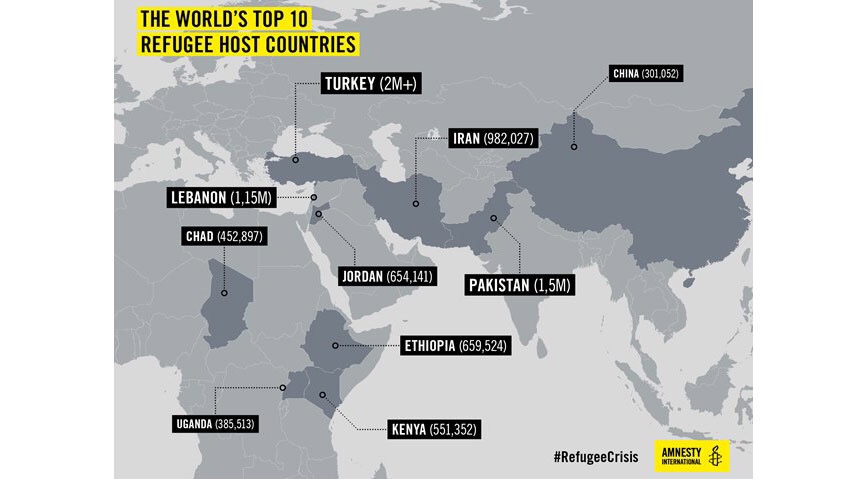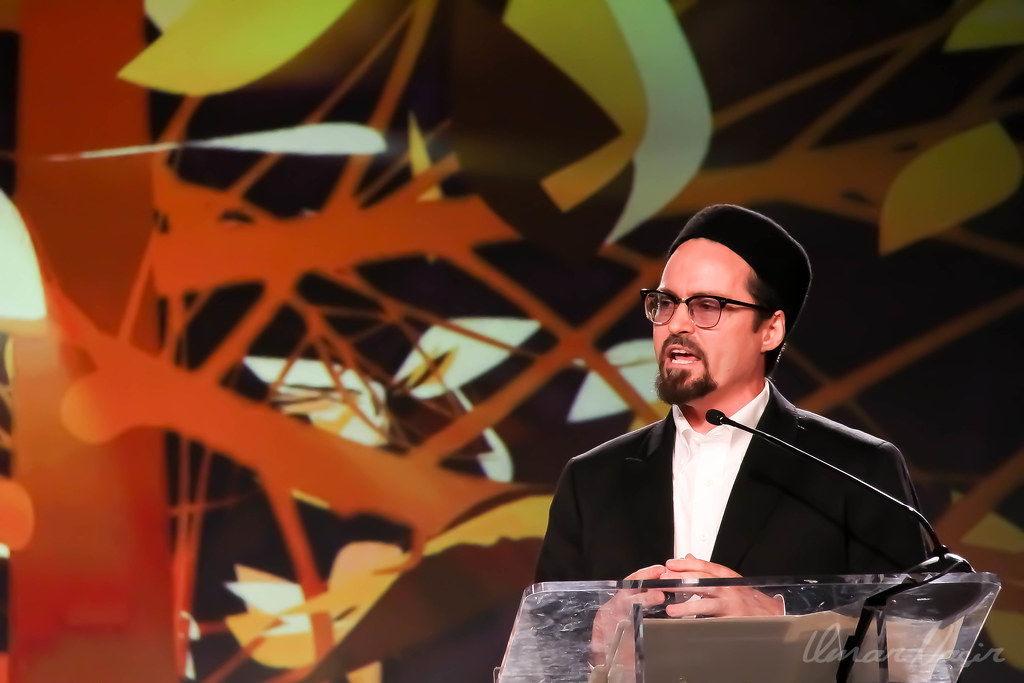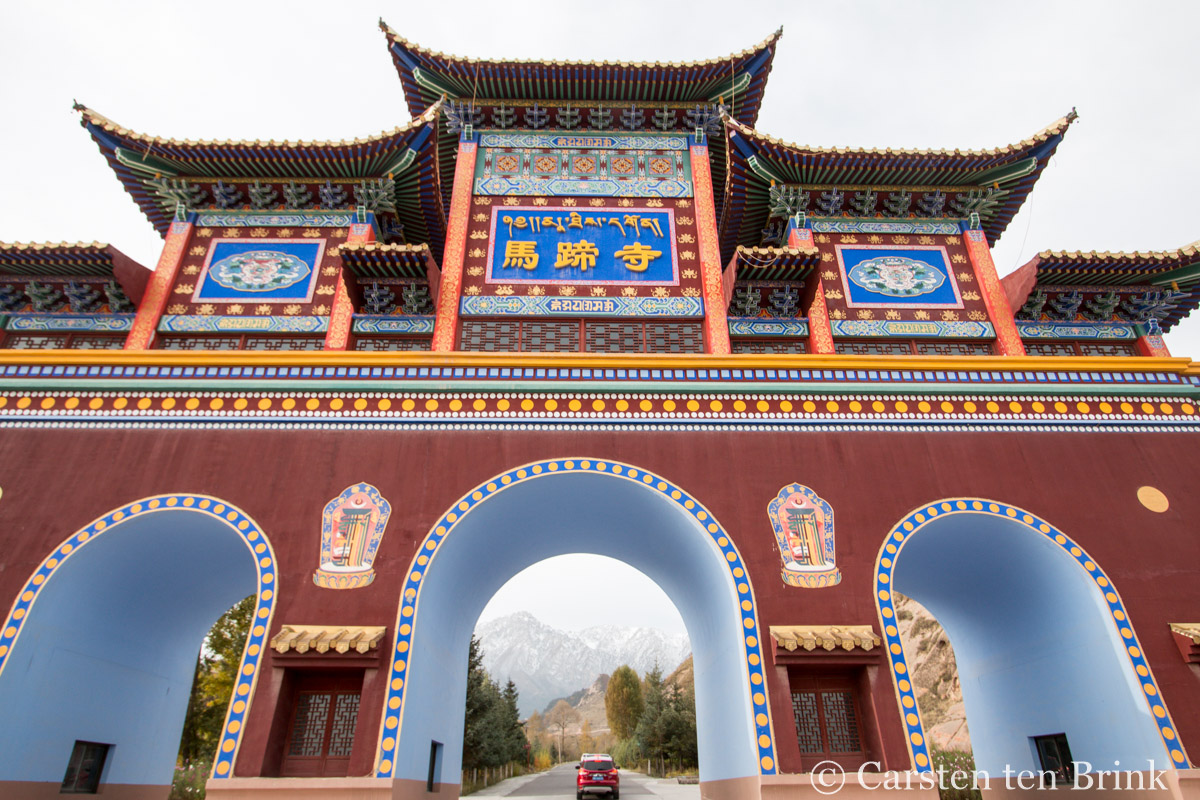The past two years have seen increasing media attention in Europe and America on the world’s ongoing refugee crisis. Airwaves are deluged with images of desparate people floating in dilapidated boats trying to reach Greece and Italy. Lines of people, dirt streaked and desparate, trudging through fields and forests in Europe. Cameras zoom out and the line stretches out into the horizon.
The hysteria, harnessed by right wing parties in both Europe and America, has led to the creation of walls and fences. Governors in America are trying to ban refugees from their states, and Presidential candidates are discussing the crisis as though all 21 million of the world’s refugees are standing at America’s door.
Amnesty International has just released a damning report that places this hysteria in context. It turns out (unsurprisingly), that the vast majority of the world’s refugees are hosted in neither Europe nor America.
Indeed, according to Amnesty “the world’s wealthiest nations host the fewest refugees, both in absolute numbers and relative to their size and wealth.”
The numbers speak for themselves. “There are 193 countries in the world and 21 million refugees. Almost half of these refugees – 12 million people –are living in just 10 of these 193 countries.”
Contrary to the media narrative that Muslim countries do not help refugees or turn a blind eye, Amnesty’s report reveals that Muslim countries are by far hosting the most refugees. Here are the numbers:
1. Jordan (2.7 million)
2. Turkey (2.5 million)
3. Pakistan (1.6 million)
4. Lebanon (1.5 million)
5. Iran (979,400)
6. Ethiopia (736,100)
7. Kenya (553,900)
8. Uganda (477,200)
9. Democratic Republic of Congo (383,100)
10. Chad (369,500)
“Almost 5 million people have fled Syria in the last five years. Most of them live in just five countries: Turkey, Lebanon, Jordan, Iraq and Egypt.”
In contrast, the UK has accepted “approximately 8,000 Syrians since 2011, while Jordan – with a population almost 10 times smaller than the UK and 1.2% of its GDP – hosts over 656,000 Syrian refugees.”
Rather than stepping up to equitably share the responsibility for refugees, many of the world’s most developed countries have expended significant resources trying to keep refugees out – through walls, legislation, inhumane conditions for undocumented people found within their borders. According to Amnesty, Australia has been at the forefront of “dismantling global standards for refugee protection. The country’s resettlement of refugees (9,400 people arrived in 2015) can in no way compensate for its longstanding punitive approach to people seeking asylum, which is arguably precipitating a global “race to the bottom” in international standards and practice.”
Europe has been little better. “In the face of the worst displacement crises in generations, the European Union (EU), the richest political bloc in the world, has actively sought to prevent asylum-seekers and refugees from accessing its territory. In what have been dubbed “Fortress Europe” policies, the EU has erected fences at land borders, deployed ever- larger numbers of border guards, and struck deals with neighbouring countries to keep people out.”
America only accepts a negligible number of refugees from Asia, Europe or Africa. The largest number of refugees arriving in the US pass through the southern border. According to Amnesty “[t]he policies of the US. . .are in theory designed to protect migrants, yet in practice serve as fast- track approaches to apprehend and deport foreigners . . . without ensuring that those in need of asylum can claim it and obtain it.”
Amnesty is calling for “much greater responsibility-sharing amongst states and for greater protection of the rights of refugees around the world. The concept of responsibility-sharing is rooted in international human rights and refugee law.”
This will only happen if all the countries of the world take a fair share of responsibility for hosting refugees. All countries should put in places refugee resettlement programmes and to increase safe and legal routes for refugees to enter the country. Currently only around 30 countries offer any kind of refugee resettlement and Amnesty is calling for this number to at least double. Further, Many countries that do offer resettlement only offer a few hundred places per year and Amnesty is calling on these states to significantly increase their annual resettlement figure.
Amnesty further notes “In order to end the ad-hoc and unpredictable nature of refugee transfer the organization is also proposing that countries agree a specific system for responsibility sharing, based on the use of reasonable criteria such as national wealth, population size and unemployment rate – common-sense criteria which acknowledge that people arriving as refugees will, at first, have an impact on the local population and resources.”
Uzma Mariam Ahmed is a lawyer and the chair of AltMuslimah’s Advisory Board.





1 Comment